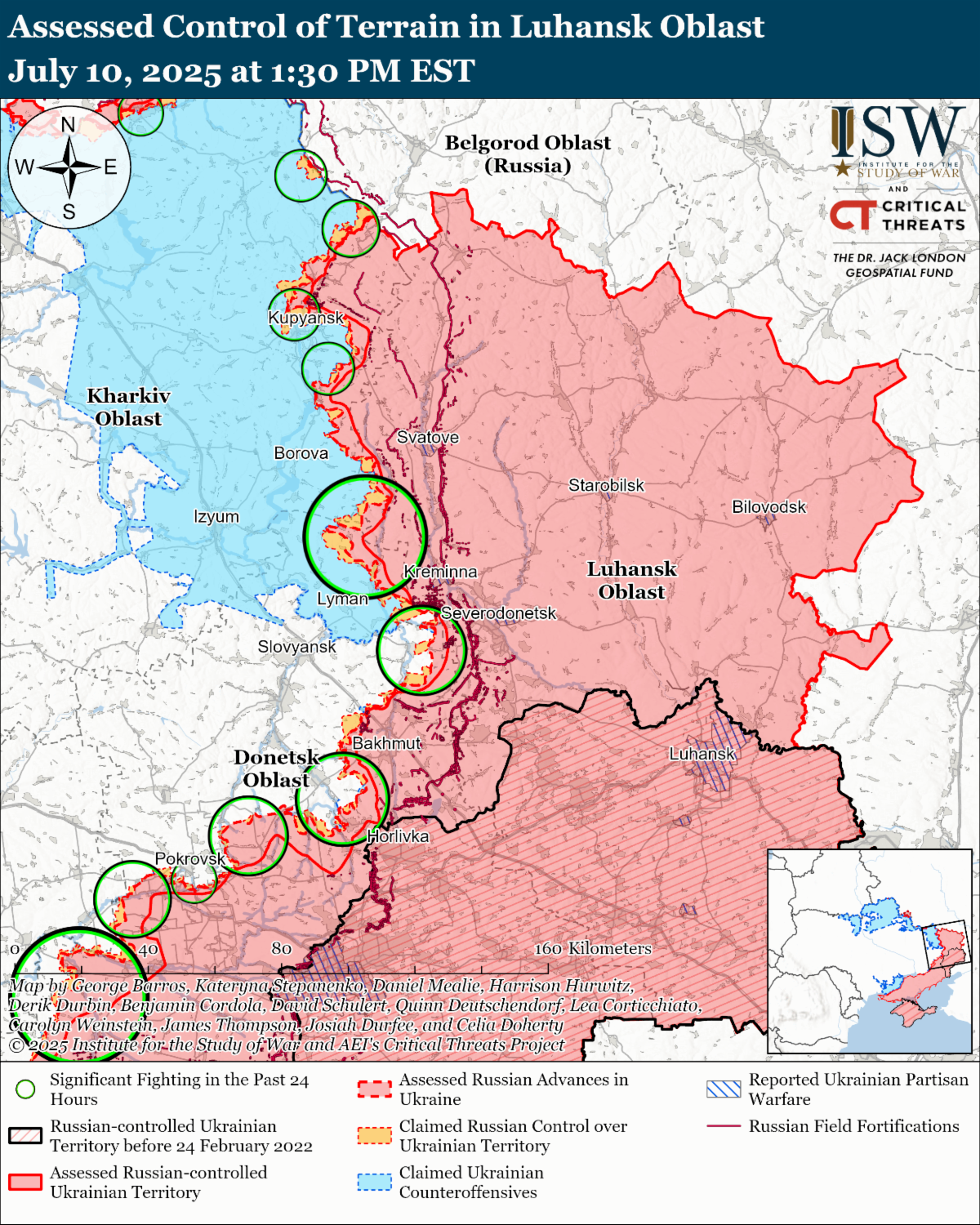US Secretary of State Marco Rubio expressed frustration following a June 10 meeting with Russian Foreign Minister Sergei Lavrov about Russia's lack of progress towards ending the war in Ukraine. Rubio stated after the meeting with Lavrov that he conveyed US President Donald Trump's frustration with Russia's insufficient "flexibility" to end the war. Rubio stated that he and Lavrov shared ideas about "a new or different approach" from Russia and that there must be a "roadmap moving forward" about how the war can end. The Russian Ministry of Foreign Affairs (MFA) claimed that Rubio and Lavrov discussed their "mutual intention" to find a solution to the war. Kremlin officials' public statements continue to demonstrate that Russia remains committed to achieving its original war goals in Ukraine and is not interested in good faith negotiations to end the war, however. Russian MFA Spokesperson Maria Zakharova reiterated on July 9 Russia's original war demands for Ukrainian regime change and "demilitarization." Kremlin Spokesperson Dmitry Peskov claimed on July 10 that Russia prefers to achieve its war goals through peaceful and diplomatic means but that the war continues and the "realities on the ground" are changing every day. Kremlin officials often call for Ukraine to recognize the "realities on the ground" (a reference to the frontline in Ukraine) to allude to the idea that Russia is in a stronger negotiating position given the battlefield situation and to demand that Ukraine concede to Russia's unwavering demands amounting to complete capitulation to Russia.
The Kremlin continues efforts to use its diplomatic engagements with the United States in an effort to divert attention from the war in Ukraine and toward the potential restoration of US-Russian relations. The Russian MFA readout of the Rubio-Lavrov meeting heavily emphasized Rubio and Lavrov's reported discussions about bilateral US-Russian issues unrelated to the war in Ukraine, including the restoration of US-Russian contacts, economic and humanitarian cooperation, direct air traffic, and diplomatic missions. The Russian MFA's readout concluded that the United States and Russia will continue dialogue about a "growing range of issues of mutual interest." Russian Deputy Foreign Minister Sergei Ryabkov claimed on July 10 there has been no "slowdown in progress" in developing US-Russian relations. ISW previously assessed that the Kremlin attempted to use economic incentives unrelated to the war in Ukraine and the prospect of US-Russian arms control talks to extract concessions from the United States about the war in Ukraine. ISW also recently assessed that Russian President Vladimir Putin unsuccessfully attempted to use Iranian nuclear negotiations and offers to mediate the Israel-Iran war to pose himself to Trump as an effective negotiator as part of efforts to secure concessions on the war in Ukraine. The Kremlin is likely attempting to push the United States to suspend its diplomatic efforts to end the war in Ukraine in exchange for developing US-Russian bilateral relations and economic opportunities.
Key Takeaways:
- US Secretary of State Marco Rubio expressed frustration following a June 10 meeting with Russian Foreign Minister Sergei Lavrov about Russia's lack of progress towards ending the war in Ukraine.
- The Kremlin continues efforts to use its diplomatic engagements with the United States in an effort to divert attention from the war in Ukraine and toward the potential restoration of US-Russian relations.
- The Economist assessed that it would take Russia about 89 years to seize all of Ukraine at its current relatively accelerated rate of advance, which has fluctuated throughout the war and is unlikely to remain constant.
- Ukrainian President Volodymyr Zelensky met with US Special Envoy to Ukraine General Keith Kellogg in Rome on July 9.
- The United States reportedly resumed some military aid shipments to Ukraine.
- Ukraine’s Western allies continue to provide military aid to Ukraine.
- Russia launched another large-scale missile and drone strike against Ukraine on the night of July 9 to 10 that heavily targeted Kyiv City, resulting in civilian casualties and significant damage to civilian infrastructure.
- Russia's strike tactics, coupled with the increased scale and concentrated targeting of Russia's recent strike packages, aim to overwhelm Ukrainian air defenses and are resulting in significant damage.
- Russian President Vladimir Putin dismissed Deputy Foreign Minister and Presidential Special Representative to the Middle East and Africa Mikhail Bogdanov on July 9.
- Russian forces recently advanced near Borova, Toretsk, and Novopavlivka.
| 




 [국방부] 미국 B-52H 전략폭격기 전개 하 한미일 공중훈련 시행
[국방부] 미국 B-52H 전략폭격기 전개 하 한미일 공중훈련 시행
 [ISW] 이란 업데이트, 2025년 7월 10일
[ISW] 이란 업데이트, 2025년 7월 10일